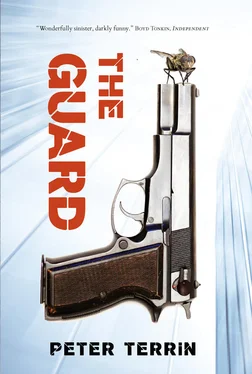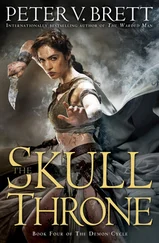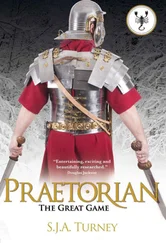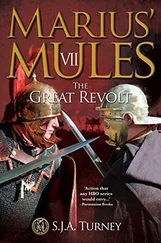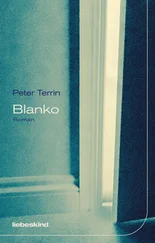I ask Harry to come in. With a shocked expression he joins me in the cubicle that isn’t really big enough for two people. I am already kneeling in front of the toilet bowl. I ask him to watch over my shoulder while I press the tip of my finger against the inside of the enamel where the water gushes down when you flush. To my great relief I see and feel the initially invisible trickle build up and find new paths on either side of my fingertip.
“The toilet’s leaking,” says Harry.
45
I turn the key in the lock of the storeroom door through two full circles and see at a glance that the ammunition is all there with every box in place, just as they were eight hours ago. I count per shelf and do the multiplications in my head. Fifteen times three is forty-five boxes. Flat and rectangular, long sides against each other. The Winchester cowboy spurs his horse, never getting any closer to himself. I check each box separately, starting with the weight, although that of course can never be a valid criterion. Behind the flap, the cartridges stand in tight lines, immaculate and gleaming like polished jewels. Our most valuable possession.
I like being in this room. I take my time. The room appears to have been created by chance in the lost space between three supporting elements, but now derives its importance from the function it has been given, the ammunition on the shelves, the food and bottled water against the wall opposite. Necessities for the protection of the building.
I think of Harry and how he assigned a function to his life at an early age, deriving importance from it. The way he owns our modest uniform and how well it fits him. How he is driven by the goal of becoming an elite security guard. He has never been lost space in a dark corner of a basement where there is no longer so much as a breath of wind to disturb the accumulated dust.
I count all of the cartridges in all of the boxes. Time has no hold over them, they are patient, they look exactly the same as the first time I counted them. Winchester, 9mm Luger (Parabellum). And like that first time, the final qualification reminds me of the Latin adage, Si vis pacem, para bellum . If you want peace, prepare for war.
46
At the door of our room I inform Harry of the results of my inspection. We pull out our Flock 28s. In turn, we silently count the contents of the cartridge clip. After I have given Harry a nod, he repeats the total from the storeroom out loud and says, “Plus two times fifteen.”
We sit down and eat bread I baked this morning. I added ingredients in the correct proportions and turned on the machine; it’s questionable whether that justifies my claim of having baked bread. Sometimes I feel like it’s not enough. There’s something missing, without which the bread, although delicious, is not real bread at all but an outstanding imitation. Harry couldn’t care less. He tears off chunks and stuffs them in his mouth in one go. It’s remarkable how he always manages to find room to turn it over and chew it up without opening his mouth.
Afterward he tells the story of Claudia and the frangipane. Chewing has brought back memories, or is it his craving for sugar? Or something else I can’t even imagine? The story dates from an increasingly distant past, but sounds like it might just as easily have happened yesterday, this morning or an hour ago. Claudia just stepped back into the elevator.
Harry is relaxed, seated, legs spread slightly. He touches his tongue with the tip of one finger and collects three crumbs that have fallen on his pants. He nibbles them between his incisors while continuing the story, which happened while I was asleep in bed. It is a drawn-out anecdote that ends with a misunderstanding Harry finds extremely amusing. Today he forgets to mention the buckled patent-leather shoes. And although it’s a minor detail, he gets Mr. Colet and Mr. Toussaint mixed up again; they both drove a white car.
47
Mr. Van der Burg-Zethoven’s fiancée lies stretched out between high walls, Italian marble extending up to the cornices. Lukewarm water trickles from a gold tap and the heady smell of cherry blossom wafts through the bathroom. She rises up from the froth, which slowly slides off her body. She dries herself with a thick towel, thoughtfully, as if dabbing a wound. She rubs lotions into her skin and plucks her eyebrows. She files her toenails and varnishes them pale pink. It is only at the very end of her toilet that she steps into a dress, lifting the bands up over her round shoulders.
It is a morning full of hope, the sky is blue. She sits down and informs the servant that she would like to drink grapefruit juice for breakfast, sweetened with half an orange. And afterward, as usual, a large cup of coffee topped with a thin layer of frothed milk. She uses a silver teaspoon to scoop strawberry jam onto crusty bread. She rests her elbow on the mahogany tabletop and holds the slice of bread up to her supple lips. Catharina’s weight is suddenly on her lap; immediately she starts to purr and settle down.
Outside the sunlight is sparkling on the leaves of hedges, shrubs and trees, on the blades of grass in the beds. Even on the helmets of the patrol. The two guards hold their dark weapons diagonally across their chests as they walk side by side across the lawn. They almost never stick to the paths, a sign in part of how reliable they are.
Mr. Van der Burg-Zethoven’s fiancée is imperturbable; she carries on with the life she has always led, unbothered by the heightened security measures. She enjoys watching the guards, who have become, in a sense, her possessions, part of the villa’s furnishings, things she can gaze upon unhindered and even touch, should she so desire. They are like the works of art hung on the walls and mounted on plinths. Their secrets stir her imagination.
48
I imprint the days in my memory. After waking — before washing and dressing — I look at the date on the cover of the calendar. Then I look inside for the day of the week. As it’s last year’s calendar, I add one day. Wednesday is Thursday. A year is made up of fifty-two weeks and one day. Of course, the calculation is imprecise, the surplus is added every four years. Next year we reach that stage: I’ll have to add two extra days and three from February 29. Wednesday on the calendar will be Saturday in reality.
Around noon, forgetfulness sets in. If I succeed at this point in summoning up the correct day, I remember it until it’s time for me to go to bed and dispatch it to the past with a cross. Much more often, I get my memories of the countless concentrated moments standing in front of the calendar mixed up. Understandably, because they always take place in the same circumstances and in the same light, week after week. I manage better when I’m sleeping before Harry. When I’m sleeping after him and wake up slowly in his presence, I say, fairly regularly, the name of the day out loud. “It’s Thursday today.” Harry never reacts. My days have been noted. I am often sure that I have remembered the day correctly only to discover in the evening that it’s Thursday again tomorrow. Or already Saturday. Memories of mistakes are especially confusing.
49
Mr. Van der Burg-Zethoven’s fiancée is appalled by the sight of the guards. Their constantly increasing numbers, their heavily armed presence: it ruins her breakfast. It ruins the garden, the villa, the art collection. It rubs her nose in the facts. Everything around her is compromised because no one can say what’s in store for her. The guards owe their existence to potential danger and therefore personify it. Their being there evokes the horror that could strike her, in whichever form, a horror that would end everything that is familiar to her, what she sees as her life, the person she is.
She orders the servant to activate the sunshade.
Читать дальше
